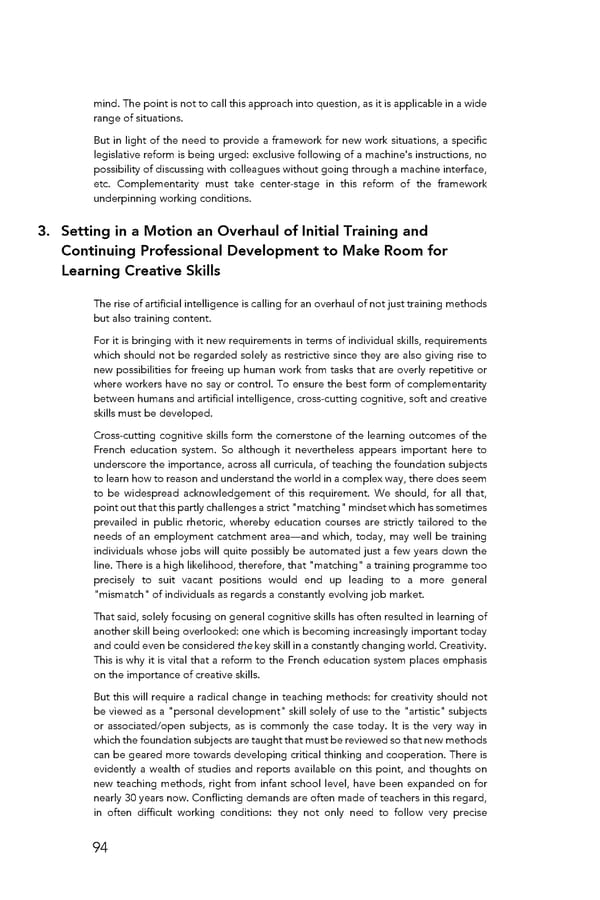mind. The point is not to call this approach into question, as it is applicable in a wide range of situations. But in light of the need to provide a framework for new work situations, a specific legislative reform is being urged: exclusive following of a machine's instructions, no possibility of discussing with colleagues without going through a machine interface, etc. Complementarity must take center-stage in this reform of the framework underpinning working conditions. 3. Setting in a Motion an Overhaul of Initial Training and Continuing Professional Development to Make Room for Learning Creative Skills The rise of artificial intelligence is calling for an overhaul of not just training methods but also training content. For it is bringing with it new requirements in terms of individual skills, requirements which should not be regarded solely as restrictive since they are also giving rise to new possibilities for freeing up human work from tasks that are overly repetitive or where workers have no say or control. To ensure the best form of complementarity between humans and artificial intelligence, cross-cutting cognitive, soft and creative skills must be developed. Cross-cutting cognitive skills form the cornerstone of the learning outcomes of the French education system. So although it nevertheless appears important here to underscore the importance, across all curricula, of teaching the foundation subjects to learn how to reason and understand the world in a complex way, there does seem to be widespread acknowledgement of this requirement. We should, for all that, point out that this partly challenges a strict "matching" mindset which has sometimes prevailed in public rhetoric, whereby education courses are strictly tailored to the needs of an employment catchment area—and which, today, may well be training individuals whose jobs will quite possibly be automated just a few years down the line. There is a high likelihood, therefore, that "matching" a training programme too precisely to suit vacant positions would end up leading to a more general "mismatch" of individuals as regards a constantly evolving job market. That said, solely focusing on general cognitive skills has often resulted in learning of another skill being overlooked: one which is becoming increasingly important today and could even be considered the key skill in a constantly changing world. Creativity. This is why it is vital that a reform to the French education system places emphasis on the importance of creative skills. But this will require a radical change in teaching methods: for creativity should not be viewed as a "personal development" skill solely of use to the "artistic" subjects or associated/open subjects, as is commonly the case today. It is the very way in which the foundation subjects are taught that must be reviewed so that new methods can be geared more towards developing critical thinking and cooperation. There is evidently a wealth of studies and reports available on this point, and thoughts on new teaching methods, right from infant school level, have been expanded on for nearly 30 years now. Conflicting demands are often made of teachers in this regard, in often difficult working conditions: they not only need to follow very precise 94
 For a Meaningful AI - Report Page 94 Page 96
For a Meaningful AI - Report Page 94 Page 96